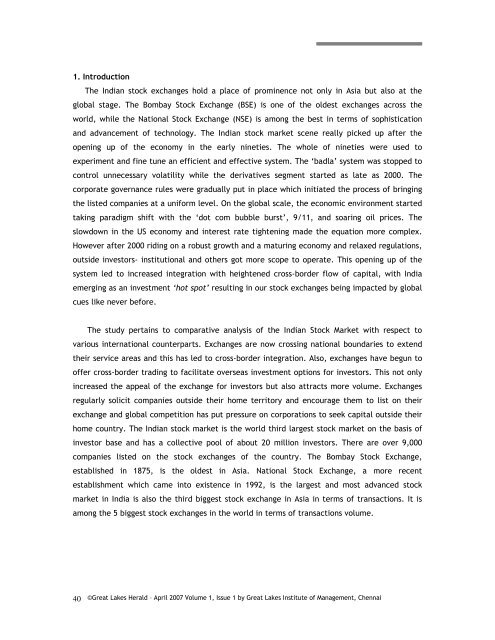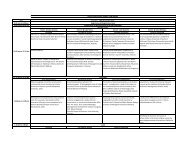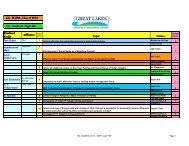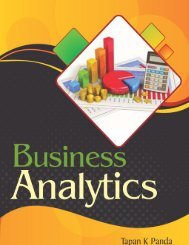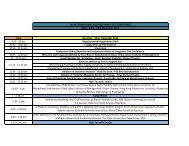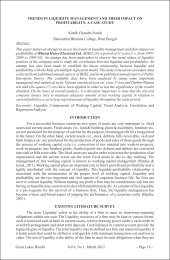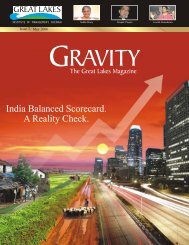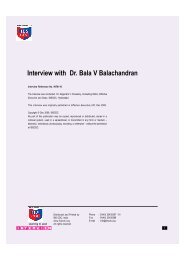Comparative Analysis of Indian Stock Market with ... - Great Lakes
Comparative Analysis of Indian Stock Market with ... - Great Lakes
Comparative Analysis of Indian Stock Market with ... - Great Lakes
You also want an ePaper? Increase the reach of your titles
YUMPU automatically turns print PDFs into web optimized ePapers that Google loves.
1. Introduction<br />
40<br />
The <strong>Indian</strong> stock exchanges hold a place <strong>of</strong> prominence not only in Asia but also at the<br />
global stage. The Bombay <strong>Stock</strong> Exchange (BSE) is one <strong>of</strong> the oldest exchanges across the<br />
world, while the National <strong>Stock</strong> Exchange (NSE) is among the best in terms <strong>of</strong> sophistication<br />
and advancement <strong>of</strong> technology. The <strong>Indian</strong> stock market scene really picked up after the<br />
opening up <strong>of</strong> the economy in the early nineties. The whole <strong>of</strong> nineties were used to<br />
experiment and fine tune an efficient and effective system. The ‘badla’ system was stopped to<br />
control unnecessary volatility while the derivatives segment started as late as 2000. The<br />
corporate governance rules were gradually put in place which initiated the process <strong>of</strong> bringing<br />
the listed companies at a uniform level. On the global scale, the economic environment started<br />
taking paradigm shift <strong>with</strong> the ‘dot com bubble burst’, 9/11, and soaring oil prices. The<br />
slowdown in the US economy and interest rate tightening made the equation more complex.<br />
However after 2000 riding on a robust growth and a maturing economy and relaxed regulations,<br />
outside investors- institutional and others got more scope to operate. This opening up <strong>of</strong> the<br />
system led to increased integration <strong>with</strong> heightened cross-border flow <strong>of</strong> capital, <strong>with</strong> India<br />
emerging as an investment ‘hot spot’ resulting in our stock exchanges being impacted by global<br />
cues like never before.<br />
The study pertains to comparative analysis <strong>of</strong> the <strong>Indian</strong> <strong>Stock</strong> <strong>Market</strong> <strong>with</strong> respect to<br />
various international counterparts. Exchanges are now crossing national boundaries to extend<br />
their service areas and this has led to cross-border integration. Also, exchanges have begun to<br />
<strong>of</strong>fer cross-border trading to facilitate overseas investment options for investors. This not only<br />
increased the appeal <strong>of</strong> the exchange for investors but also attracts more volume. Exchanges<br />
regularly solicit companies outside their home territory and encourage them to list on their<br />
exchange and global competition has put pressure on corporations to seek capital outside their<br />
home country. The <strong>Indian</strong> stock market is the world third largest stock market on the basis <strong>of</strong><br />
investor base and has a collective pool <strong>of</strong> about 20 million investors. There are over 9,000<br />
companies listed on the stock exchanges <strong>of</strong> the country. The Bombay <strong>Stock</strong> Exchange,<br />
established in 1875, is the oldest in Asia. National <strong>Stock</strong> Exchange, a more recent<br />
establishment which came into existence in 1992, is the largest and most advanced stock<br />
market in India is also the third biggest stock exchange in Asia in terms <strong>of</strong> transactions. It is<br />
among the 5 biggest stock exchanges in the world in terms <strong>of</strong> transactions volume.<br />
©<strong>Great</strong> <strong>Lakes</strong> Herald – April 2007 Volume 1, Issue 1 by <strong>Great</strong> <strong>Lakes</strong> Institute <strong>of</strong> Management, Chennai


